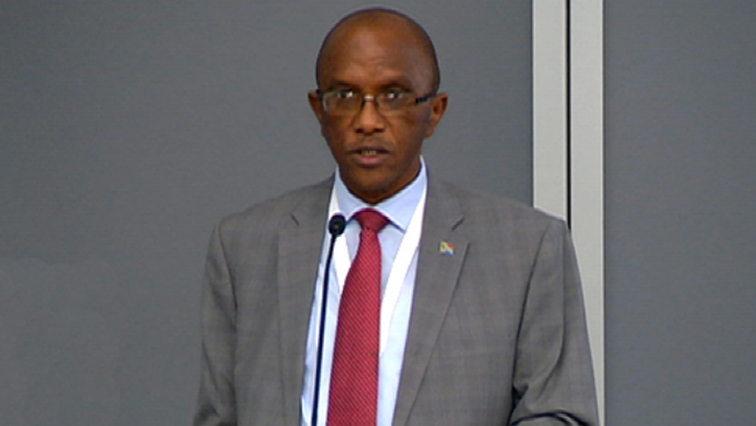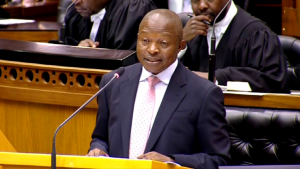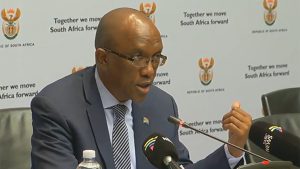The late Auditor-General Kimi Makwetu has been remembered as a great mentor and leader. Makwetu passed away last Wednesday at the age of 54.
He succumbed to Stage 4 lung cancer. His memorial service has been taking place at the Marriott Hotel in Melrose, Johannesburg.
AGSA Corporate Executive, Mmabatho Mase Sedikela says Makwetu served his country with dignity.
“We honour a man that has touched many lives. We honour a man who was an example of a great leader. We honour a man who has served the country with distinction, who loved his family dearly. AG never missed an opportunity to teach, to guide to mentor and to lead us. A true servant leader. Let’s build on the firm foundation he laid. We will and we must continue where he left off.”
Makwetu memorial service under way:
South Africa’s Auditor-General Kimi Makwetu
Education and political activism
In article first published on The Conversation, Mills Soko, Professor: International Business & Strategy, Wits Business School, University of the Witwatersrand, wrote: “Having attended local schools in Gugulethu – Songezo, Luzuko and Fezeka – Kimi moved to St John’s College in the Eastern Cape in 1982. Established by Anglican Church bishops in 1879, St John’s represented a formative experience for him and influenced his worldview. The school enjoyed a reputation for excellence in natural sciences and it was there that Kimi developed a love for mathematics and science. Above all, St John’s instilled a rigorous sense of self-discipline that served him well in subsequent years.
After St John’s Kimi went to study at the University of Cape Town. It was during this time that I first met him. This was during orientation week in 1989. I was browsing through various sets of political literature at the orientation stalls on the upper campus.
He came up behind me, looked at a pamphlet I was reading and voiced disapproval. I was taken aback, as I did not know him and could not understand why he objected to me reading the pamphlet. It dawned upon me later that his action was not unrelated to the raging battles among student organisations then for the “ideological soul” of the university.
During the 1980s, the place was a hotbed of political ferment, derisively described as “Moscow on the Hill”. It was a theatre of sharp ideological contestations, pitting student political formations aligned to the African National Congress against those affiliated to other liberation movements and organisations, such as the Pan-Africanist Congress of Azania and Azanian People’s Organisation. There were also other stridently assertive political voices such as the New Unity Movement, as well as those representing an assortment of Trotskyist ideological currents.
Kimi was one of the leading lights within the student movement, alongside other stalwarts who would later occupy senior leadership positions in successive post-apartheid governments. Kimi held leadership roles in the Black Students Society, South African National Students Congress and South African Tertiary Institutions Sports Council.
Amid the growing influx of working-class black students, the University of Cape Town was constantly convulsed by protests against academic and financial exclusions, accommodation shortages and institutional cultural problems. During these tumultuous times, Kimi always led from the front, opining, counselling, guiding, cajoling and restraining. He was a member of numerous student delegations that met the university management, led then by Vice-Chancellor Dr Stuart Saunders.
An ardent champion of non-racialism, he was one of the leaders who astutely steered the process of merging the predominantly black South African National Students Congress and the mainly white National Union of South African Students. His political activism extended beyond the university campus and he was, among others, a prominent figure within the Cape Youth Congress.
Professional career
After he left university, Kimi took up positions in the corporate sector, including accounting firm Deloitte. It was at Deloitte that he completed his articles and sharpened his auditing skills, rising to the position of director in the firm’s forensic unit. His experience at Deloitte exposed him to multiple industries and companies. It also empowered him to understand complex financial statements.
Soon after being appointed auditor-general in 2006, Terence Nombembe approached Kimi and asked him to consider joining his office as his deputy. They had worked together for many years and had built a strong personal and professional rapport. Kimi joined the office in 2007. He cited public interest considerations as central to his decision.
Kimi succeeded Nombembe as auditor-general in 2013. He did well to shape his role in ways that made him a visible champion of public accountability and probity. He also managed to cement the reputation of the office as a beacon of meritocracy and a training ground for ambitious and talented professionals who yearned to make a positive contribution to South Africa.
Although diplomatic in his public pronouncements, he was privately mortified by the pervasive corruption that paralysed governance in the country. He was optimistic that the new powers granted to the office would yield positive results. These powers authorise the auditor-general to take remedial action against corruption, ensure that losses suffered by the state are recovered, and refer certain suspected irregularities for investigation.” (Read the original article here.)





